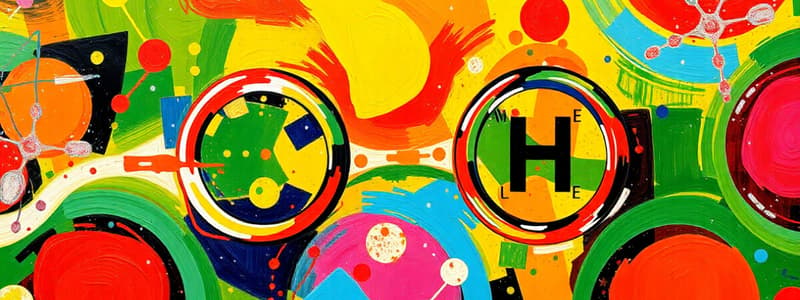Podcast
Questions and Answers
What type of bond is formed between a metal and a nonmetal?
What type of bond is formed between a metal and a nonmetal?
- Metallic bond
- Ionic bond (correct)
- Covalent bond
- Polar bond
Which of the following compounds is a binary ionic compound?
Which of the following compounds is a binary ionic compound?
- Na3N
- H2O
- MgCl2
- NaCl (correct)
What charge does a cation have?
What charge does a cation have?
- Positive charge (correct)
- Neutral charge
- Negative charge
- Variable charge
What happens to valence electrons in the formation of an ionic bond?
What happens to valence electrons in the formation of an ionic bond?
Which of the following statements is true regarding ionic compounds?
Which of the following statements is true regarding ionic compounds?
Which group of elements typically forms anions?
Which group of elements typically forms anions?
What is the charge of the ion formed by an element in Group 17?
What is the charge of the ion formed by an element in Group 17?
What is the result of an ionic bond formation?
What is the result of an ionic bond formation?
What describes a crystal lattice structure?
What describes a crystal lattice structure?
What is a property of ionic compounds in their solid state?
What is a property of ionic compounds in their solid state?
Which statement accurately describes ions in a solid ionic compound?
Which statement accurately describes ions in a solid ionic compound?
What is lattice energy?
What is lattice energy?
Why do ionic compounds conduct electricity when dissolved in liquid?
Why do ionic compounds conduct electricity when dissolved in liquid?
What effect does increasing charge on ions have on lattice energy?
What effect does increasing charge on ions have on lattice energy?
Which of the following best describes electrolytes?
Which of the following best describes electrolytes?
How does the presence of water affect the conductivity of ionic compounds?
How does the presence of water affect the conductivity of ionic compounds?
Flashcards are hidden until you start studying
Study Notes
Ionic Bonds and Ionic Compounds
- Ionic bonds are formed between metals and nonmetals through the transfer of electrons.
- Metals lose electrons to form positively charged cations.
- Nonmetals gain electrons to form negatively charged anions.
- Binary ionic compounds are composed of two elements, a metallic cation and a nonmetallic anion.
Determining the Charge of Ions
- The group number of an element in the periodic table dictates its charge.
- Group 1 elements have a +1 charge.
- Group 2 elements have a +2 charge.
- Group 13 elements have a +3 charge.
- Group 16 elements have a -2 charge.
- Group 17 elements have a -1 charge.
Crystal Lattice and Properties of Ionic Compounds
- Ionic compounds form a crystal lattice structure, where positive and negative ions are arranged in a three-dimensional pattern.
- The strong electrostatic attractions between oppositely charged ions in a crystal lattice result in:
- High melting and boiling points due to the large amount of energy required to break the bonds.
- Poor electrical conductivity in the solid state, as electrons are tightly held and cannot move freely.
- Good electrical conductivity when dissolved in water or molten, as the freely moving ions can carry electric charge.
Energy and the Ionic Bond
- Lattice energy is the energy required to separate one mole of ions from its crystal lattice.
- A higher lattice energy indicates a stronger ionic bond.
Studying That Suits You
Use AI to generate personalized quizzes and flashcards to suit your learning preferences.



